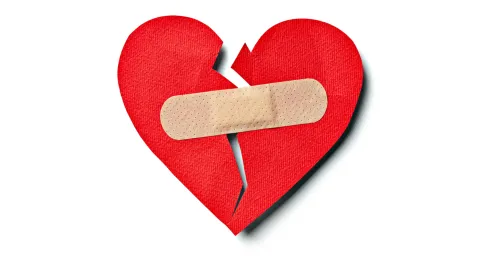Women and Heart Disease: Broken Heart Syndrome

While 'broken heart syndrome' may sound like the theme of a romance novel, it's a very real health condition that mostly affects women. In fact, more than 90 percent of reported cases occur in women ages 58 to 75.
Also called takotsubo cardiomyopathy or stress cardiomyopathy, broken heart syndrome is a condition in which the heart muscle suddenly becomes weakened or stunned, and the left ventricle, one of the heart's lower chambers that's responsible for pumping oxygen-rich blood to tissues throughout the body, temporarily changes shape.
This condition was first identified in 1990 in Japan. It was named 'takotsubo' because during the acute phase of this syndrome, the left ventricle balloons out and takes on a shape similar to a Japanese fisherman's octopus trap (called a takotsubo).
This can produce symptoms that feel just like a heart attack, including chest pain (angina), shortness of breath, nausea, sweating, irregular heartbeat, anxiety, and loss of consciousness or fainting. Importantly, however, broken heart syndrome isn't caused by any underlying cardiovascular disease.
What Causes Broken Heart Syndrome?
Broken heart syndrome most commonly occurs after someone experiences extreme emotional or physical stress, such as the death of a loved one, divorce or break-up, strong arguments, an accident, or a natural disaster.
Research suggests that the sudden release of stress hormones in reaction to such an unexpected event is what 'stuns' the heart. This triggers changes in heart muscle cells and coronary blood vessels which, in turn, weakens the left ventricle and prevents it from pumping blood to the rest of the body.
While the exact cause of broken heart syndrome isn't known, some experts think it affects women more than men due to hormones, and/or because of differences in the way women and men react to stress.
How Is Broken Heart Syndrome Diagnosed and Treated?
Because the symptoms of broken heart syndrome are so similar to a heart attack, tests must be done right away. These tests may include an electrocardiogram (measures the electrical activity of the heart), echocardiogram (heart ultrasound), coronary angiogram (catheterization) or a cardiac MRI.
Treatment of broken heart syndrome depends on the severity of symptoms, and the cardiologist may prescribe medications such as an ace inhibitor, beta blocker and/or diuretic. Rest is also important, as well as learning to recognize stressors and how to manage them.
The good news is that broken heart syndrome is rarely fatal, and the condition generally resolves within weeks or months. But it can cause severe short-term heart muscle failure even if your coronary arteries are not blocked. So, it's crucial that you seek medical help right away.
Treat Any Chest Pain as a Medical Emergency
Heart disease is the number one cause of death in women. If you experience any chest pain, shortness of breath or irregular heartbeat that lasts for more than a few minutes, whether you've just been through a stressful experience or not, don't ignore these symptoms! Call 911 for medical assistance immediately. Without expert testing, there's no way of knowing if these symptoms are from a heart attack or broken heart syndrome, and it's always better to be safe than sorry.
Guest Blogger: Erica Archambeau, BS, RDCS, Manager, Cardiac Ultrasound, UMass Memorial Medical Center
Other related articles by:
Broken heart syndrome | chest pain | effect of sudden stress on heart | emotional stress | heart attack | physical stress | shortness of breath | stress cardiomyopathy | women and heart diseaseNote: The content of this blog is for informational purposes only. It is not intended for use as diagnosis or treatment of a health problem or as a substitute for the professional consultation of a physician or qualified health care provider. If you have specific questions or concerns regarding a health or medical condition, contact your physician or a licensed health care professional.

